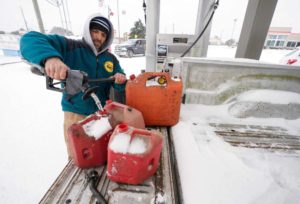Opinion: Reliable power isn’t a clean energy problem. It’s a Texas energy problem.
Publlc Citizen's Adrian Shelley explains why Texans lost power
This op-ed first appeared in the Houston Chronicle. Read it online here.

By Adrian Shelley
Millions of Texans are without power this week after a record-setting winter storm ravaged our state.
Rolling blackouts and sub-freezing temperatures have thousands of Texas families scrambling for extra blankets, thick socks and firewood as they endure a lack of electricity for, in many cases, 24 hours or more. Not long after the first numbers revealing the extent of the damage were released, the finger-pointing began.
Some blamed the grid operator, the Electric Reliability Council of Texas. But the coldest weather in decades set new energy demand records even as nearly half of expected energy generation simply disappeared. ERCOT was in a tough spot.
But why couldn’t fuel-rich Texas keep the heat on?
Conservative corners of social media lit up with chatter about frozen wind turbines causing the loss on Monday of about four gigawatts of expected energy, while statewide demand exceeded 69 gigawatts.
As the facts emerged, it became clear that wind was not the primary culprit in the disaster. Coal, natural gas and nuclear power — so-called thermal sources — lost at least 26 gigawatts of generation, according to Jesse Jenkins, an engineering professor at Princeton University. All told, the power losses more than doubled ERCOT’s most extreme projections.
At first, Texas Gov. Greg Abbott acknowledged the role of coal and natural gas in the blackouts. But as the attacks on clean energy escalated from the right, Abbott walked back his statements Tuesday night on Sean Hannity’s show on Fox News, rushing to blame wind, solar, and somehow, the Green New Deal bill. Houston-area Rep. Dan Crenshaw and Texas Commissioner of Agriculture Sid Miller also continued spreading this misinformation.
The failure of natural gas generation was predictable. Ten years ago this month, Barry Smitherman, who was the chairman of the Public Utility Commission of Texas, assured a joint committee of the Texas Senate that he would review plans to keep the Texas power grid safe from extreme weather events. Smitherman had been called to the Senate to answer for rolling blackouts that occurred on Feb. 2, 2011.
A decade later, there is little evidence that natural gas generators heeded this warning, and neither have oil and gas drillers, who lost 1 million barrels of production in the Permian Basin on Monday due to frozen equipment.
Price is everything in a market-based system. Power producers make money only by generating electricity cheaply and selling it for profit. On Monday the PUC took steps to ensure that generators would maximize profits. But only those that could endure freezing temperatures could participate. If they hadn’t invested in weatherized equipment, the market had already failed.
This doesn’t mean that marginally profitable fossil fuel sources deserve special treatment. Far from it. The lesson from this week’s disaster is that thermal sources aren’t the ultra-reliable “base load” resource that fossil fuel champions would have you believe. Investment in reliability should focus on modern solutions such as battery storage.
If this week’s generation failures were beyond ERCOT’s control, what could it have done to manage energy demand? In cities across Texas, people shared pictures on social media of well-lit city skylines surrounded by residential communities shrouded in darkness. To the public’s eyes, when ERCOT couldn’t or wouldn’t reduce load from empty office buildings it cut power to their homes instead.
In a briefing with state lawmakers on Tuesday, ERCOT revealed that there is no state standard to ensure critical services such as hospitals always have access to electricity. Many lawmakers seemed unaware of just how limited ERCOT’s authority is.
Blackouts are a blunt instrument, as millions of Texans enduring days-long power outages can now attest. State lawmakers need to know if ERCOT lacks the tools to ensure supply and manage demand during extraordinary times. Both the Texas House and Senate have called emergency hearing s for next week and Abbott has designated ERCOT reform as an emergency item for this year’s legislative session.
If the past decade has taught us anything, it’s that climate change must be an integral part of the conversation to come. Ten years ago, Texas lawmakers were prone to point to cold temperatures as evidence that global warming was a hoax. Today, we understand that climate disruption leads not only to hot summers but possibly more frequent appearances of the infamous polar vortex and the freezing weather it brings.
Transitioning to clean, renewable energy and away from dirty, polluting fossil fuels was always going to be difficult in Texas, where oil and gas have long reigned. But this week has shown that providing reliable power isn’t a clean energy problem. It’s a Texas energy problem.
Shelley is the director of Public Citizen’s Texas office.